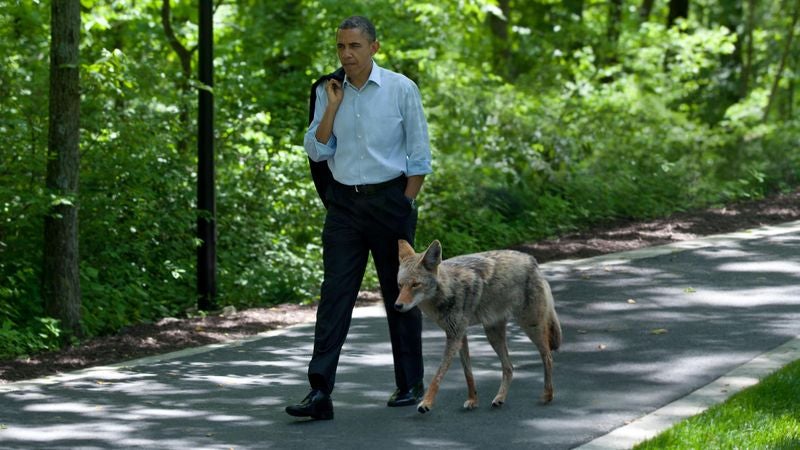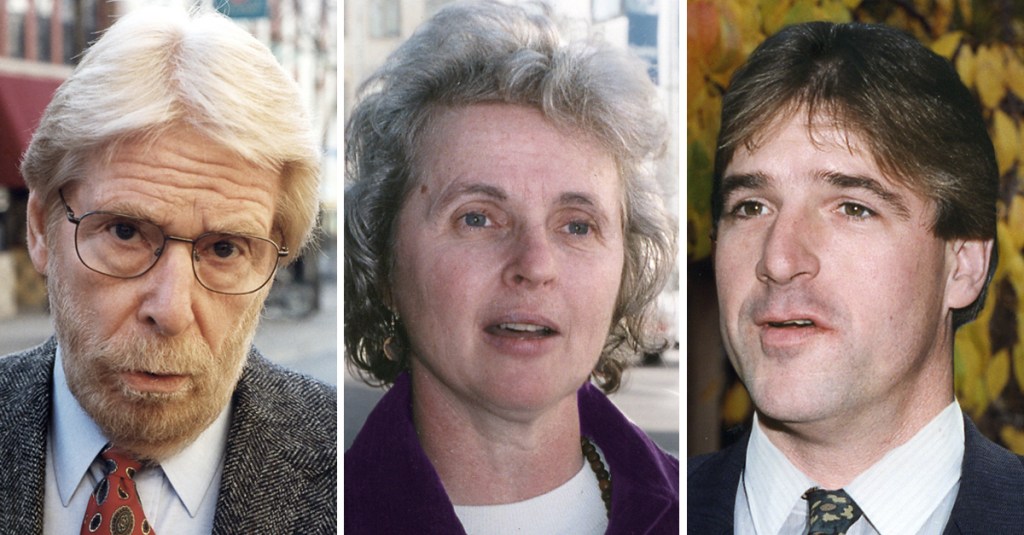THURMONT, MD—Predicting a landmark diplomatic breakthrough in the historically bitter and contentious relationship, President Barack Obama said Wednesday he has high hopes for talks this week at Camp David intended to ease tensions with the coyote population.
The three-day summit, attended by top U.S. officials and leading members of the coyote community, is the first in a series of peace negotiations aimed at resolving decades of bloody strife between the wild canine species and the American people. Aides said the two parties would seek to address a lengthy list of grievances, including outrage among the coyote delegation over thousands of deaths in recent years at the hands of American hunters and speeding cars, as well as mounting anger from the Obama administration regarding coyotes’ persistent attacks on U.S. livestock and a continuing string of antagonistic trash can topplings.
“Though we come from vastly different cultures, social backgrounds, and taxonomic ranks, coyotes and Americans are united by a shared desire to coexist peacefully on the hiking trails and campsites of this great land,” Obama told reporters in a morning press conference at the presidential retreat as he stood alongside the U.S. delegation and a pack of coyote dignitaries. “After years of strained relations, and small incidents that have boiled over into larger ones, the time has come to address the violence and killing on both sides.”
“Together, we can resolve our land disputes and put a stop to the unnecessary bloodshed,” he continued. “Our hope is that one day, coyotes and Americans will no longer regard one another with fear, and instead live together in harmony.”
The current meeting marks the first peaceful gathering of its kind since the mid-1990s. For decades, the two groups have been locked in what experts describe as a vicious cycle of brutality and retribution, with members of the coyote population repeatedly crossing into agricultural zones where they inflict mass casualties and cause extensive property damage, which in turn provokes enraged Americans to send in federal Wildlife Services agents to gun down and poison approximately 80,000 coyotes per year, a response many in the diplomatic community have criticized as disproportionate.
According to sources, Obama and the visiting envoy of coyotes hope to make significant progress on several core issues, especially border disputes in contested areas between U.S. suburbs and key wooded regions. However, deep-seated American resentment over the coyotes’ refusal to stop tunneling underneath their backyard fences is expected to make any compromise difficult, as is the unwillingness of coyotes to budge on the right to prowl through city parks late at night and howl for hours on end.
Sources confirmed that talks between the parties nearly broke down earlier today following a heated incident in the Laurel Lodge conference room, when a member of the coyote party sprang toward the throat of a White House staffer carrying a tray of refreshments into the meeting.
“This is a watershed moment for both sides, and it is imperative that this summit succeeds if we wish to avoid another Buena Park,” said Adrian Lockhart, a leading scholar of the U.S.–coyote conflict, referencing the Southern California city where a local family’s pet dachshund was brutally attacked by a coyote in 1987, which many historians regard as a breaking point in relations that precipitated the ongoing internecine clash. “But frankly, the negotiators will have a difficult time reaching terms that are acceptable to hardline American sheep and goat ranchers who have difficulty seeing the species as anything but cold-blooded killers, given that many of them have looked on helplessly as their animals were ruthlessly murdered before their very eyes.”
“Of course, just as hard to appease will be those coyote families who, going back to the 19th century, have had loved ones trapped and skinned by American fur hunters,” he continued. “Within the coyote population, where day-to-day survival is so much more difficult than it is among the U.S. population, a deep and abiding wariness of Americans is simply a way of life. That’s going to be hard to overcome.”
Sources have noted that progress, albeit minor, has been made since the talks began. During a closed-door session today, Obama reportedly offered to temporarily halt the building of settlements in lands traditionally held by the coyotes, extracting in exchange a promise that the animals keep at least five feet away from all urban compost piles.
Moreover, sources say that both sides remain optimistic about renewing a major National Park–sharing agreement that was initially brokered by representatives from the U.N., E.U., and red fox communities during a summit in 2002.
“Although we still have a long way to go, the two sides gathered here have taken an important step toward securing our common future,” the president said later as he stepped into Camp David’s Hickory Lodge to partake in a traditional coyote meal of raw rabbit and garbage. “Neither side wants to perpetuate this cycle of violence by passing this anger and disdain onto our children and pups. We believe they deserve better.”







